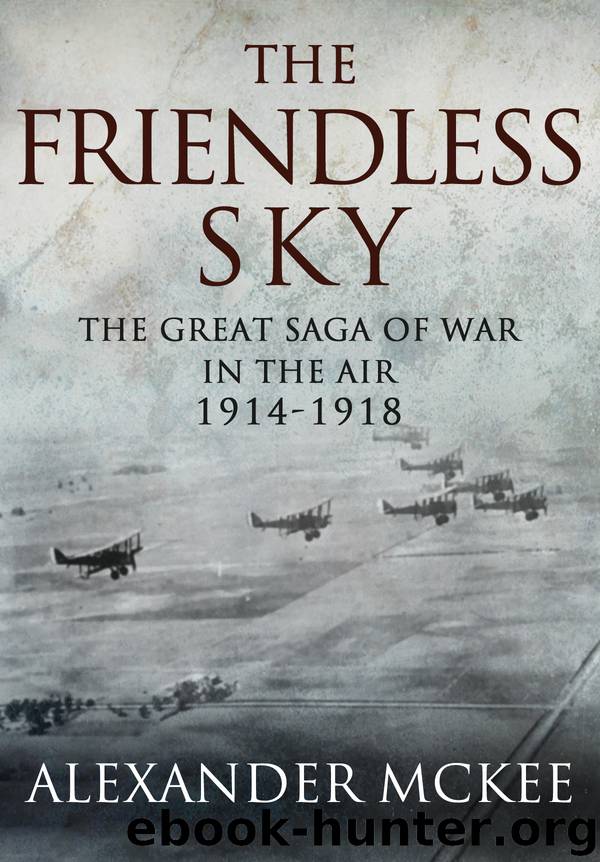The Friendless Sky: The Great Saga of War in the Air, 1914-1918 by McKee Alexander

Author:McKee, Alexander [McKee, Alexander]
Language: eng
Format: epub
Publisher: Endeavour Media
Published: 2016-05-11T16:00:00+00:00
12 - ‘Bloody April’
In every organization there is an ‘organization man’. In an air force, he tends to be tough, ruthless, and necessarily deskbound. He becomes known to the general public not at all, and in more limited circles, only when he writes his memoirs after the war. Sefton Brancker was the ‘organization man’ of the RFC, but he broke all the rules by dying a spectacular death in the airship R101, backing official policy with his life, and paying forfeit for the mistakes. War is a succession of mistakes, because decisions must be made without full knowledge of the facts, and is therefore more an art than a science; there is an element of luck, or of flair. Brancker made a number of allowable mistakes. Although a comparatively junior officer in 1914, he took a rapid series of decisions which were the basis of the expansion of the RFC and the industry which had to be built up to support it. In his determination to get things done, he moved too fast. Some of the aircraft types ordered were wrong, but they were in existence, and their short-comings had not been revealed when he made his decisions. He got quantity, both in machines and men, but many of the machines were inferior and the men were both poorly trained and insufficiently experienced when sent to the front, indeed they could hardly fly, let alone fight.
But the very qualities of drive and determination which almost overnight turned piano makers into aircraft factories contained also the defect of stubbornness. His memoirs abound with a defence of the BE2c. He was always searching for evidence, among the adverse reports from all fronts which would place the blame on the insufficient aggressive qualities of the pilots rather than on the inherent defects of the machine; and occasionally, he thought he had found it. In fact, the German opponents of the inexperienced young men he sent up in out-dated rattletraps thought far more highly of the average RFC pilot than he apparently did. The crews of the German fighters and observation machines, in their letters and autobiographies, stress the aggressiveness of British pilots; the only criticism they have, is that sometimes the British carried the offensive spirit to the point of foolhardiness and beyond.
A weaker man than Brancker would not have held so long to a mistaken view; and the results would have been less catastrophic. A more subtle man might even have cancelled the production run of the type, and modified those already in service. The basic defect of the BE2c was that even Attila himself could not have fought from it; the pilot sat behind, and the observer in front of him was directly behind the engine, underneath the top plane, surrounded by struts and wires, and if he poked a machine-gun out of it he had an impossibly limited field of fire. To change the position of the cockpits, as the Germans did with their own version of this sort of aeroplane, would have at least given the crew a sporting chance.
Download
This site does not store any files on its server. We only index and link to content provided by other sites. Please contact the content providers to delete copyright contents if any and email us, we'll remove relevant links or contents immediately.
| Africa | Americas |
| Arctic & Antarctica | Asia |
| Australia & Oceania | Europe |
| Middle East | Russia |
| United States | World |
| Ancient Civilizations | Military |
| Historical Study & Educational Resources |
Leaving Orbit by Margaret Lazarus Dean(835)
Enemy Coast Ahead by Guy Gibson(712)
The SAS Training Manual by Chris McNab;(706)
The True Story of Catch 22 by Patricia Chapman Meder(618)
Comet! The World’s First Jet Airliner by Graham Simons(617)
Outlaws Inc. by Matt Potter(591)
Airborne by Tom Clancy(559)
The Wright Company by Edward J. Roach(549)
The Other Side of Airfix by Authur Ward(543)
Memoirs of a Stuka Pilot by Helmut Mahlke(540)
Beyond Band of Brothers by Richard D. Winters(531)
Hitler's Eagles by Chris McNab(514)
Air Warriors by Douglas Waller(493)
Boyd by Robert Coram(485)
Pegasus, The Heart of the Harrier: The History and Development of the World's First Operational Vertical Take-off and Landing Jet Engine by Andrew Dow(484)
Stormchasers by David Toomey(472)
Airborne (1997) by Clancy Tom(469)
Focke-Wulf Fw 190 by CHRIS GOSS(454)
I Always Wanted to Fly by Wolfgang W. E. Samuel(430)
